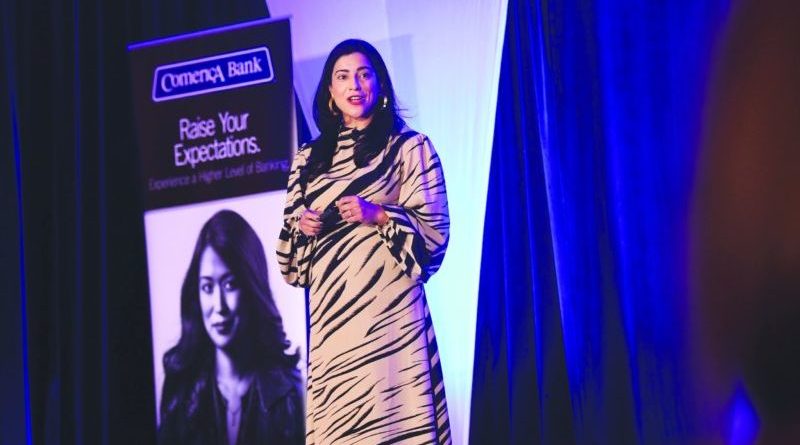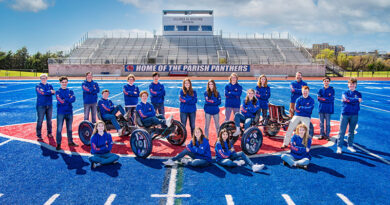Girls Who Code Aims to Address Gender Gap
Reshma Saujani is on a mission to bring up a worldwide cohort of girls who can code – despite not knowing how to do so herself.
And while that might seem like a mind-bender, the Girls Who Code founder said that her situation is actually a great way to illustrate to the parents of her core audience that just because they don’t know how to code, doesn’t mean they can’t encourage their daughters to get involved.
“I just don’t feel like it’s a prerequisite that we have to know how to do it for our kids to learn how to do it,” she said during a break in Comerica Bank’s recent Dallas Women’s Business Symposium, where she was keynote speaker. “It’s economic opportunity – take, for instance, how much you make as a software engineer, something like $120,000 a year.
“Those are the conversations I have in those communities where they’re like, ‘Wait, my kid can make what?’”
Saujani, an attorney and activist, first gained notice when she ran for Congress in 2010. That foray into politics led her to the classroom, where she saw a gender gap in computing classes that led to the start of Girls Who Code.
Saujani points to the ongoing gender gap in the computer science field as the driving force behind her organization, which has now served more than 185,000 students to date. It has more than 700 clubs in Texas and roughly 11 in the Dallas area, including clubs or programs at the Hockaday School, some Dallas ISD schools, and the Dallas Public Library.
“Dallas is actually one of our largest networks of Girls Who Code clubs,” she said.
The link between learning to code and changing the world, Saujani said, is also something she hopes her organization can demonstrate.
“Girls want to change the world – they think about things like ‘my friend’s being bullied at school,’ or ‘my brother’s dyslexic,’ and a lot of other things they want to solve,” she said, adding that showing girls how to use technology to address those problems is paramount.
The organization’s other aim is to get more women in computer science fields.
“When we started in 2012, people talked about this issue like there was a pipeline problem – there’s just not enough women, there’s just not enough people of color,” Saujani said. “And now, seven years later, we’ve taught a lot of that, but now the challenge is, ‘Will you hire them?’”
So what do you do, if you’re a parent of a girl, to make sure they at least know that coding is an option?
“To me, it’s even deeper than that,” Saujani said. “You have to let your girls get dirty and use their hands to fix things and to break things. You have to let them learn how to solve problems. We need to be very intentional about what we put in front of our girls.”
Below is an extended look at our conversation with Saujani.
People Newspapers: We’re seeing a bigger and bigger push for STEAM subjects in schools, but what do you think is some of the holdup in girls specifically getting involved?
Reshma Saujani: “I think it’s culture. You know, there’s a study that just came out that saying, you know, 74 percent of women want it. Girls want to change the world. So when they think about, ‘Oh, my friends being bullied at school,’ ‘My brother’s dyslexic,’ ‘My mother’s overweight’ — all these things that they want to solve, and we do a poor job of showing them the connection between coding and change-making.
And that’s why we’ve taught 185,000 girls across the country. We have 10,000 girls who code clubs. Dallas is actually one of our largest networks of Girls Who Code clubs. So we are oversubscribed in many ways. So we’re seeing a shift in interest, I think that that is very much correlated to having a shift in the conversation. But we still have a lot to do.”
PN: We’ve seen the discussions of things like Gamergate, and the misogyny in the industry itself. Do you think that the potential of eventually having even more girls grow up and enter that job market can help mitigate some of this?
RS: “Here’s the thing: I think for when we started in 2012, people talked about this issue like there was a pipeline problem — ‘There’s just not enough women. There’s just not enough people of color.’
And now, seven years later, we’ve taught a lot of that. Now the challenge is, ‘Will you hire them? Are your cultures amicable to changing, to hiring people who are different than the ones who have, you know, quite frankly, built or created many of the technologies?’
I think that you’re now starting to see a lot of bravery amongst the women who are in technology to talk about their experiences and how many of these cultures are broken, and the work that we have to do now.
I believe in infiltration. I believe that if you teach us enough and we put enough into the pipeline that you changed the critical mass. They often say on corporate boards, if you can cross 30 percent women, you can see a sea change.
That’s really what we’re trying to kind of move towards, is really changing the numbers enough that there’s a critical mass of women. So it’s I’m not the only one, but there’s two of my sisters or three of my sisters, and now we’re able to actually influence and shift culture in a meaningful way to bring more women in into it, to make sure that the women who are there feel like it’s a place that they can grow and stay.”
PN: It seems like we’re seeing more conversations not just about mentorship, but sponsorship — where maybe you’re not shepherding someone through, but you are making sure that someone has opportunities. Are you seeing that in tech, too?
RS: “I think I want to see more of it. I mean, I think part of it is, for example, with Girls Who Code, 50 percent of my students are under the poverty line and 50 percent of my students are black and Latino.
For lack of a better word, I set a quota that I was intentional about the students that I want to teach every year.
So you have to be very intentional about what you want, and what you want your leadership team to look like. And so to me, I think that like I will feel like there’s a lot more sponsorship happening when I actually see those numbers looking different than they do.”
PN: Somewhat adjacent to coding, Dallas ISD just added e-sports to its roster of activities, and I was really excited to see girls in the photos that went out with the press release. Do you think recognizing that girls like to game too also can spur that interest in coding?
RS: “It helps. When I speak at college campuses, I asked them to be monitoring that. What is your e-sports club look like? How many girls are actually participating? Are we giving them opportunities?
I think girls just don’t want to play shooter games and we still know whether it’s on Twitch or, you know, it’s on Reddit or whatever, that there’s a lot of harassment for women and girls on those places. And so you don’t feel safe. Girls don’t feel safe. So I hope that the culture in e-sports responds to what we’ve learned as to that girls want to game, but they don’t feel included.”
PN: If you’re a parent of daughters, what do you do to make sure they at least know that these fields are an option?
RS: “So to me, it’s even deeper than that. And I just wrote a book about this – ‘Brave, Not Perfect.’
So my son loves Legos, right? He’s always like building things. But when I went to the Lego store to buy something for his friend, who’s a girl, I had two options – I could either buy a kitchen set or a dollhouse.
So we still need to make sure as parents were very intentional about the things that we’re putting in front of our girls.
To me that it starts there and it starts out like one or two years old, you know.
I think the third thing is, is around, you know, six or seven girls get it in their heads that they’re either good at something or bad at something. So I’ll go to a robotics class and I like it the first time. But the second time I go, it was harder for me. What happens? I’m a girl. I come back home, I say I don’t want to go anymore. Because we start learning that you can give up before we ever try.
PN: So if you’re a parent to a boy, how do you raise sons that are more inclusive and don’t see jobs and tasks as “boy jobs” and “girl jobs?”
RS: “Like my son Sean – I take him to work with me.
Let them see you speak. And so he let well, listen to me attentively during a speech. And he knows that mommy is out there making the world a better place. So his view of leadership is very female.
I also feel like with him, too, it’s like we’ll go shopping, you know, he’ll be, ‘I want Batman,’ and I’ll be, ‘Great, I’d like you to buy Ms. Marvel, too. For Halloween, We’re all dressing up like Megan Rapinoe. So it’s like part of it is also putting that culture around your sons to allow them to celebrate female leaders and women who are doing incredible things.”
PN: You spoke earlier about making sure there were clubs in areas with high poverty rates and such – but how do you get buy-in from parents who sometimes are working two jobs themselves or may have never gone to college, and may see this as another difficult schoolwork thing they can’t help their children with?
RS: “I think that we have such a shortage of engineers and people technical talent that this is the job that you get to march up into the middle class. You know, I was just this my father yesterday in Chicago and my parents came here as refugees. And my dad came here with like $10 in his pocket. And my father even though he worked as a machinist in the plant, he was an engineer. And so that being able to have that degree allowed us to buy a home. It’s why I’m sitting here today. Go to great schools.
So I started this organization because I also really wanted to fight poverty.
We’re having a lot of conversations around automation and how bad it is and it’s inevitable. But what’s worse is that we’re not preparing our children for these jobs because the last jobs to go will be the humans telling the computers what to do.
I just think that we have such a huge, huge, huge opportunity. And I think that we should just start pushing this as a skill set that we want our kids to learn. And listen, it’s hard — I’m not a coder. I was an engineer. And so as a mom it’s hard. If I wasn’t in this field, it would be hard for me to tell my son, ‘Hey, you should really learn this,’ because I don’t even know what it is.
So it’s hard to expect parents to tell their children they should learn something that they themselves don’t know what to do. And so we need to have an entire countrywide conversation about why this skill set, frankly, is like reading and writing.
It’s economic opportunity – take, for instance, how much you make as a software engineer, something like $120,000 a year. In starting pay. Those are the conversations I have in those communities where they’re like, ‘Wait, my kid can make what?’
I just don’t feel like it’s a prerequisite that we have to know how to do it for our kids to learn how to do it.”
Learn more about Girls Who Code by clicking here.







